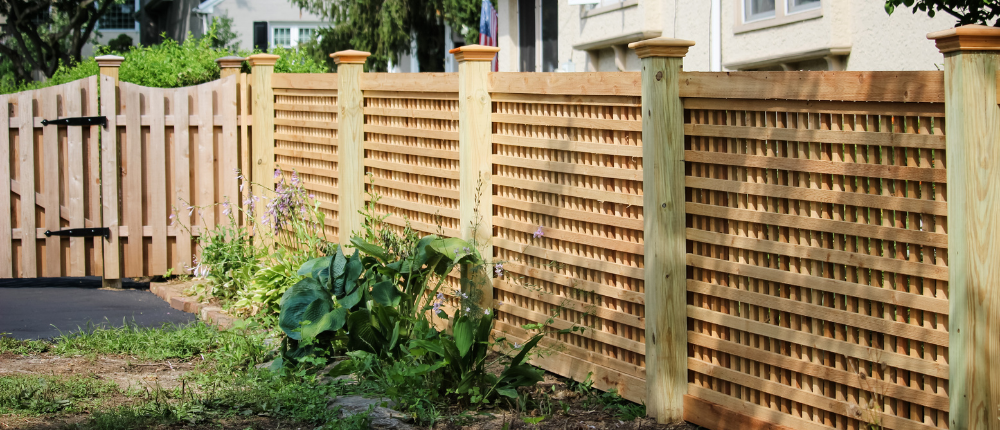All Categories
Featured

When it comes to selecting the appropriate fencing material for your residential or commercial property, plastic, wood, and aluminum are amongst the most prominent choices. Listed below, we break down the benefits and negative aspects of these three common fencing materials.
Timber Fence. Pros:
Aesthetic Allure: Wood fencings supply an all-natural, classic appearance that matches most kinds of landscaping and style. They can be quickly tailored with paint or discolor, giving you the liberty to produce the best shade and finish for your residential property. Convenience: Timber can be made use of to develop a range of fence styles, from standard picket fencings to extra modern-day layouts like personal privacy fences or rustic ranch-style fences. If your requirements transform, it's very easy to add or change to over time. Cost: Timber is generally much more economical than vinyl or light weight aluminum, making it an attractive choice for house owners on a budget plan. The preliminary cost of a wood fence is generally lower than the various other materials. Cons:

Maintenance Requirements: Wood fencings call for regular maintenance, including discoloration, securing, or paint to secure them from weathering, rot, and insect damage. Without correct care, timber can weaken promptly. Longevity: Wood is prone to damage from bugs like termites, and it can warp, crack, or split with time because of direct exposure to the components. In locations with extreme weather condition conditions, wood may require to be changed more regularly than other materials. Restricted Lifespan: While timber fences can last for lots of years with appropriate treatment, they usually have a shorter lifespan than vinyl or aluminum fencings. Plastic Secure fencing. Pros:
Reduced Maintenance: One of the largest benefits of vinyl secure fencing is its low maintenance requirements. Unlike wood, vinyl does not need to be painted, tarnished, or sealed. It's immune to fading, splitting, or warping, making it suitable for property owners that desire a hassle-free fencing. Durability: Vinyl fences are extremely resilient and resistant to the aspects, consisting of UV rays, rainfall, and moisture. They're likewise invulnerable to parasites, such as termites, that can harm timber fencings. Range of Styles: Vinyl fencings been available in a variety of colors and designs, and lots of imitate the appearance of wood without the maintenance disadvantages. You can pick from personal privacy fences, picket fences, and more to suit your needs. Long Life-span: With appropriate care, vinyl fencings can last years, far longer than timber fences, and they come with warranties that supply assurance. Cons:
Greater Preliminary Cost: While vinyl fencings can conserve money on upkeep over the years, they have a tendency to have a higher ahead of time cost than timber fencings, which might be a deterrent for some customers. Restricted Customization: While vinyl fences are readily available in a selection of designs and colors, they do not have the personalization flexibility that wood provides. You're restricted to the pre-designed panels readily available, which might not match every special aesthetic. Prospective for Fracturing in Cold Climates: In extreme chilly temperature levels, plastic fences can come to be breakable and might fracture under impact, making them much less ideal for locations with freezing winters months. Light weight aluminum Fence. Pros:
Longevity and Strength: Aluminum is a lightweight yet strong product that resists corrosion and deterioration, making it optimal for coastal locations or areas with high moisture. Light weight aluminum fences need minimal upkeep and can hold up against the aspects for many years. Aesthetic Appeal: Aluminum fencings offer a sleek, modern-day look. They can be found in a selection of ornamental designs and can be utilized to produce an extra contemporary or classy seek your building. Reduced Maintenance: Light weight aluminum fencings don't require painting or securing, and they're immune to corrosion and deterioration, making them incredibly reduced upkeep gradually. Safety and security: Aluminum fencings offer a higher degree of safety compared to vinyl or timber fencings as a result of their sturdy building. They can be geared up with locks and entrances to give a protected boundary around your residential property. Cons:

Expense: Light weight aluminum fences are often a lot more pricey than timber or vinyl fencings, both in regards to materials and installation expenses. This greater price point can be a downside for budget-conscious house owners. Much Less Personal privacy: Aluminum fencings usually have an even more open design, with pickets spaced apart to allow presence via the fence. If privacy is a concern, this may not be the most effective option for your property. Prone to Denting: While light weight aluminum is rust-resistant, it can still be nicked or bent if struck with force, such as by a car or heavy devices. While it won't rust, it may not retain its pristine look if it gets harmed. Which Product is Right for You? Picking the ideal fence product depends on your particular requirements, budget plan, and long-lasting plans for your residential property. On the other hand, if you require a durable, secure fencing with a smooth appearance, aluminum may be the appropriate product for you.
Ultimately, consider your environment, upkeep choices, and aesthetic wishes when picking your secure fencing material. Each option has its toughness and weaknesses, yet with the ideal care and setup, all three can supply dependable and eye-catching limits for your residential or commercial property.
Latest Posts
Find Out Reduce Expenses on Car Maintenance with Montclare Auto Repair’s Limited-Time Deals
Published May 31, 25
1 min read
Explore Special Auto Repair Deals in Chicago at Montclare Auto Repair
Published May 30, 25
1 min read
Discover the Premier Auto Repair Offers in Montclare, Chicago
Published May 25, 25
1 min read
More
Latest Posts
Find Out Reduce Expenses on Car Maintenance with Montclare Auto Repair’s Limited-Time Deals
Published May 31, 25
1 min read
Explore Special Auto Repair Deals in Chicago at Montclare Auto Repair
Published May 30, 25
1 min read
Discover the Premier Auto Repair Offers in Montclare, Chicago
Published May 25, 25
1 min read